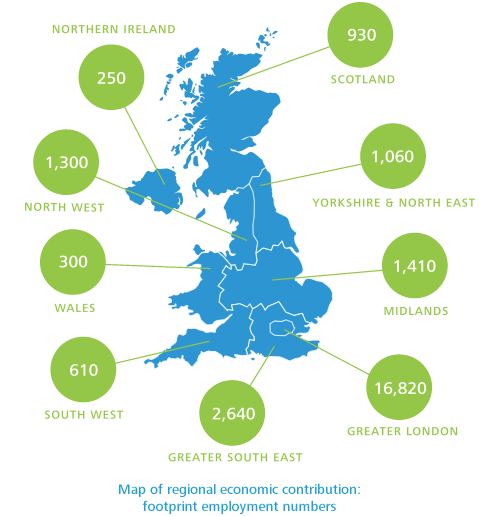Driving sustainable economic growth
Regional economic impact
For the first time, this year, we have quantified the impacts our regional offices have on their respective regional economies. Not surprisingly, our offices in Greater London contribute the greatest share of UK economic activity, but the impact of Deloitte in the regions is significant in many ways.
Collectively, the 18 regional Deloitte offices accounted for 4,830 full-time equivalent jobs in 2013. This is reflected in the wage premium Deloitte pays across the UK relative to average wages across the economy.
These higher wages permeate local and regional economies, and along with business-to-business purchases in the supply-chain, account for a wider economic footprint than Deloitte’s direct impact.
In the regions (excluding Greater London), we estimate that a further 3,800 jobs are supported by supply-chain purchasing by Deloitte and consumer spending by Deloitte employees, equating to a further £160m of Gross Value Added contribution.1

Footprint employment: is a measure of the total employment impact generate by Deloitte's day-to-day activities, as well as indirect business-to-business effects from Deloitte purchases. and induced effects through consumer spending by Deloitte. There is a further 30,600 employment impact (primarily from indirect and induced effects) within the UK which cannot be allocated to a specific region or nation.
Regional growth and development
We are committed to supporting and contributing to regional growth and development, and it is often through our regional work that we are able to have the greatest impact.
Our work in Northern Ireland provides a real example of how, through our professional and technical skills, we are making a real and sustained impact on important societal challenges at a local and regional level. Over the past few years, through our consulting practice, we have engaged with a range of public and third sector clients in supporting many of the issues and challenges Northern Ireland society continues to face as it deals with the legacy of the conflict in the region.
We also seek opportunities to support the growth agenda of each city and regional marketplace in which we operate. This has involved working with Local Enterprise Partnerships (LEPs), inward investment and regional development agencies and infrastructure hubs. Through our regional offices, we advise many large privately owned businesses, a range of PLCs, key public sector bodies and growing entrepreneurial businesses. Our regional business provides a bespoke CFO Development Programme to over 200 aspiring CFOs, offering access to academic training, insight from existing CFOs and Board representatives and support in the individual’s career journey.
We are enhancing our technology expertise in Northern Ireland to enable the expansion of the Belfast Technology Studio; a move which should assist in the creation of an additional 177 jobs over the next three years.
We have further influenced regional growth by establishing greater international links, particularly in the North West with our engagement and support of the Manchester China Forum. The Manchester China Forum has been set up to increase Greater Manchester’s links with China and to foster a business climate that enables business in Greater Manchester to further develop relationships with China. Deloitte was engaged to identify additional strategic goals and high-impact initiatives, based on a review of relevant plans and strategies and through engagement with key stakeholders. The report highlighted the current approach to conducting business in China, reviewed international profile opportunities and identified potential opportunities which would help the Manchester China Forum build on the strategic links they have to date.
1A fixed coefficient model of the UK economy including constituent nations and regions has been used to estimate the supply chain and consumer spending impacts of Deloitte activity. Because purchasing patterns between regions and consumer spending patterns outside ‘workplace’ regions are unknown (particularly an issue with respect to Greater London and the South East), much of the knock-on economic activity is unattributable. As many as 30,000 jobs and £1.7bn in economic activity fall into this category. The values presented should be treated as estimates, and given the unattributable nature of many jobs, these are likely to be an underestimate.





